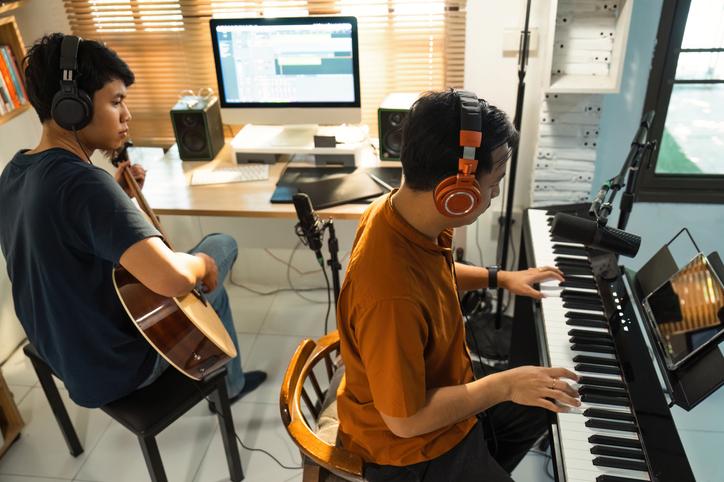
How can we support aspiring mature student creatives?
You may also like
Interrupting or changing a career to pursue an undergraduate degree in music, film, drama or English requires significant bravery. Mature students undertaking creative arts undergraduate courses report gaining confidence to follow their passions with age, case-study research has revealed. They often follow unconventional educational routes into higher education and juggle numerous responsibilities. Creative industries students also need to factor in creative pursuits such as music lessons, drama rehearsals, research for writing and time for practising their art. What support could improve their experience?
Practical
Carrying out work experience in the creative industries can help mature students confirm their career decisions, broaden their horizons, understand the sectors they’re interested in and build their networks. In addition, placements offer workplace familiarity and exposure to professional standards that can increase confidence during job searches. However, unrealistic time expectations can hinder participation.
Mature students appreciate:
Staggered work experience options: offer shorter commitments over a longer period instead of a single block. For example, offer a placement supporting the organisation of an arts festival at a senior level over the course of a year instead of two weeks on-site assisting with crowd control.
A condensed timetable: ensure opportunities take place within school hours and working lunches to reduce commuting requirements and maximise efficiency. Agree on dates in advance to allow students to plan effectively.
Online/remote experiences: offer opportunities to contribute remotely to project work.
Make the most of existing skills: mature students with previous management or leadership experience in other sectors appreciate their transferable skills being recognised and used. For example, engaging a mature creative student in a consultancy role to critically assess an initiative, highlight gaps and create recommendations offers a valuable experience.
Individual
Mature students are often pivoting from previous non-creative careers or returning to education after raising families. They have a huge bank of skills but often don’t know which are relevant and how to sell these to employers. To help prepare mature students moving into the creative sectors, I recommend:
- Supporting students to adapt their CVs for the sectors they wish to enter. For example, “successfully juggling multiple priorities under pressure” and “negotiating outcomes” are skills that can be used both on a film set and when raising children.
- Helping students prepare for interviews by providing space to practise articulating their experiences.
- Informing students of labour market information and recruitment cycle timings, particularly with highly competitive graduate schemes, and helping them understand the needs of small and medium-sized enterprises.
- Digital upskilling students by teaching them how to build online portfolios of work, effective LinkedIn profiles or websites promoting their freelance businesses.
- Building confidence by offering constructive feedback as students navigate the recruitment process and present creative output.
Institutional
While mature creative students in case-studies research highlighted their individual support needs, they also highlighted issues at a broader institutional level. These observations related to their course provision, but also to support services. This is how we can help:
Champion inclusive marketing: encouraging a student to attend an event or initiative can be difficult if they can’t picture themselves there. So showcase a variety of ages and subjects in marketing and communication activities. Not every student wears a white coat or spends the day looking into a microscope.
- Resource collection: Lifelong learning that will last
- Universities need to prepare for the mature student onslaught
- The three Cs of the 21st-century workplace: cognition, character and career
Leverage their experience: it can be a difficult transition from an established career to student life. Use their expertise, flip the classroom and help them take ownership of their learning. For example, during an interview skills workshop, I engage mature students by asking them to share their past interview experiences, including what they were asked, what was successful and what they learned. Since this cohort is likely to have been interviewed before, their stories not only interest other students but also encourage them to reflect on their own journeys.
Facilitators can also ask students to present five-minute case studies on workplace issues they have encountered and ask the class what they would do. They can then guide their classmates through possible scenarios before revealing what actually happened. This develops confidence and work professionalism and enhances communication and problem-solving skills.
Watch for subject bias: mature arts students often feel second best to STEM peers due to perceived unequal investment and promotion, which employers are invited onto campus and how success is measured. Let’s stop pitching the subjects against each other and have more cross-disciplinary collaboration. Initiatives that focus on the UN’s 17 Sustainable Development Goals need the perspective of more than one discipline. For example, the QUB Future Ready Skills for Leaders programme brings together students from all subjects and levels of study to work in cross-disciplinary teams with an employer mentor to identify and solve real-world problems. The best-performing groups always include a mixture of subjects.
Collaborate and add value: the students in the previously mentioned study all successfully challenged course structures. For example, one student wanted to complete six specific modules in one year but, due to timetable clashes, they would have to sacrifice one class. This student successfully argued they could complete four modules in one semester and two in the next. Not only did they complete all six modules, but they used the extra time in semester two for additional work experience.
Mature students bring innovation and confidence to the student body that academics and professional staff can use to improve the student experience. Leverage their ability to give timely and practical feedback. Regular and consistent feedback networks are key. Get them on staff/student committees and build flexibility into the institutional mindset – if the only constant is change then we must be able to change.
By providing tailored support and fostering collaboration, universities can help mature students achieve their career goals while also making significant contributions to the creative sectors they enter, cultivating highly skilled, motivated graduates who are highly likely to challenge your processes for the better.
Emma Lennox is a careers consultant at Queen’s University Belfast.
If you would like advice and insight from academics and university staff delivered direct to your inbox each week, sign up for the Campus newsletter.




